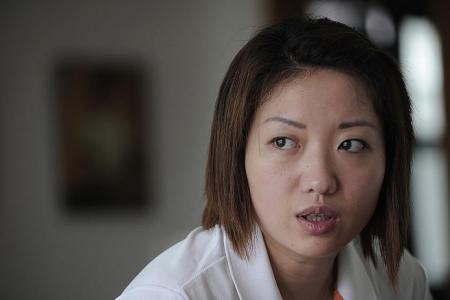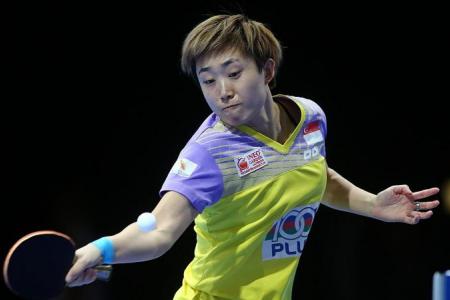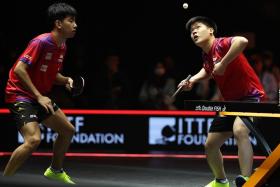Paddlers need team effort, says Jiawei
Former table-tennis star Li Jiawei says Singapore cannot rely only on Feng
Feng Tianwei has always returned home with at least one Olympic medal after each Games.
Singapore's table tennis star won a silver on her Olympic debut in 2008 in Beijing, as part of the women's team who finished second to the all-conquering hosts.
She was part of the same team that grabbed a bronze in London 2012, when Feng also finished third in the women's singles.
Li Jiawei and Wang Yuegu, her teammates for the last two Olympics, have since retired, which suggests Feng will have more pressure on her shoulders to deliver in the team event.
If the women's team aim to make it a hat-trick of medals, it is clear Olympic debutants Yu Mengyu and Zhou Yihan will also have to step up.
Speaking to The New Paper recently, Li said: "It is hard for me to say if Singapore can continue to win medals because it really depends on how they perform on the actual day, and the difference between winning and losing could come down to the smallest details or just a few points.
"Winning medals will have to be achieved by a team effort and not an over-reliance on just one player.
"In 2008, even though I was the most experienced player on the team, Yuegu and Tianwei played equally important roles. We were really a strong and balanced team then.
"The doubles segment of the team event is also crucial and I remember teaming up with Yuegu to beat the South Koreans to give us a 2-1 lead in the semi-finals. We eventually won 3-2 and ended up with a silver."
With Liu Shiwen (world No. 1), Ding Ning (2) and Li Xiaoxia (5) in their team, China will almost certainly stroll to team gold.
The competition for silver and bronze will be between Japan, South Korea and Singapore, with North Korea, Taiwan and Germany all dangerous on their day.
Singapore's world No. 4 Feng, Yu (15) and Zhou (34) have risen up the rankings after recent results.
Feng, 29, remains the only player on the team to have beaten any of the three Chinese paddlers over the last four years.
Li, now 34, believes Feng has what it takes to win a medal in the women's singles again, despite the hectic schedule and niggling injuries to her shoulder and knee.
"Tianwei is very hard on herself as she sets very high standards in terms of performance and results," said Li.
"When it comes to table tennis, she is very serious but she is also a tough athlete who has proven that she can deliver when it matters most."
Feng also has the upper hand over all her Japanese rivals - Kasumi Ishikawa (world No. 6; 9-4 record), Ai Fukuhara (7; 13-3) and Mima Ito (9; 2-1) - which could prove vital after Singapore lost to Japan in the team semi-finals at the last Olympics.
UPSET
Zhou, the youngest player on the team at 22, beat the higher-ranking South Korean duo of Jeon Ji Hee (11) and Yang Ha Eun (24) at last month's Japan Open.
She also partnered Lin Ye in a shock 3-0 doubles win over China's Liu and Ding 3-0 in last year's Japan Open semi-finals.
Meanwhile, Yu, 26, has fared well against the Japanese, overcoming Ito at last October's Polish Open, before beating Ishikawa in this year's final.
These results will influence the strategy employed by Singapore women's team coach Chen Zhibin, as he works out who to field for the first and second singles, taking into consideration his players' head-to-head record against various opponents.
"The improvement in world rankings will greatly help in the form of better seedings, which helps the team and individual players avoid strong opponents earlier in the competition," said former Singapore star Li, who has battled in four Olympics, starting in 2000.
"But the players still have to go out there and beat the lower-ranked opponents first. Otherwise, the better seedings will just be a number.
"This will be the first Olympics to be held in South America and there will be conditions to get used to and jet lag to overcome.
"The advantage will go to those who adapt fastest.
"I can understand the nerves and excitement of playing in their first Olympics, and I have gone through the transition from merely participating to being expected to win a medal.
"These are mental aspects they have to conquer, and the key difference between my time and now is Singapore table tennis is receiving a lot more support in terms of sports science and match exposure, which should stand our players in good stead."
“In 2008, even though I was the most experienced player on the team, Yuegu and Tianwei played equally important roles... I remember teaming up with Yuegu to beat the South Koreans to give us a 2-1 lead in the semi-finals.”
— Former Singapore Li Jiawei, on the importance of the younger players stepping up
Get The New Paper on your phone with the free TNP app. Download from the Apple App Store or Google Play Store now




